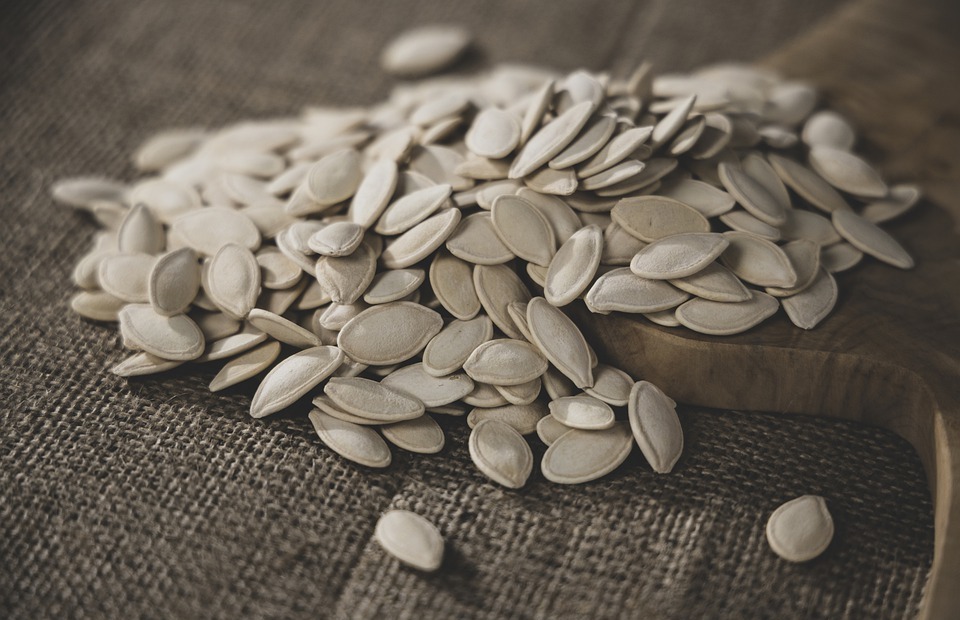This comprehensive guide will explore the safety and nutritional benefits of pumpkin seeds for dogs. We'll delve into the potential risks, the best ways to feed them, and answer common questions about this popular dog treat.
Part 1: The Benefits of Pumpkin Seeds for Dogs

1.1. Nutritional Powerhouse
Pumpkin seeds are a nutritional powerhouse, packed with essential vitamins, minerals, and antioxidants that can benefit your furry friend's health.
1.1.1. Essential Nutrients
Protein: Pumpkin seeds are a good source of protein, which is essential for muscle growth and repair, as well as for maintaining a healthy immune system. A 100-gram serving of pumpkin seeds provides about 20 grams of protein, making them a valuable addition to a dog's diet, especially for active dogs or those recovering from illness.
Omega-3 Fatty Acids: These healthy fats support brain function, heart health, and a shiny coat. Omega-3s are also beneficial for reducing inflammation, which can be helpful for dogs with joint pain or skin conditions.
Fiber: Pumpkin seeds are high in fibre, which promotes digestive health and can help prevent constipation. The soluble fibre in pumpkin seeds can also help regulate blood sugar levels.
Vitamins and Minerals: Pumpkin seeds are rich in vitamins like Vitamin E (an antioxidant), Vitamin K (for blood clotting), and minerals like zinc and magnesium. Zinc is crucial for immune function, wound healing, and skin health, while magnesium supports muscle function, nerve health, and energy production.
1.2. Digestive Health
Pumpkin seeds can help improve your dog's digestive health in several ways:
1.2.1. Supporting Regularity
The high fibre content in pumpkin seeds aids in regulating bowel movements and preventing constipation. Fibre adds bulk to the stool, making it easier to pass.
1.2.2. Reducing Digestive Issues
Pumpkin seeds have anti-inflammatory properties that can help soothe digestive discomfort, making them helpful for dogs with Irritable Bowel Syndrome (IBS) or other digestive issues. They can also help reduce diarrhoea by absorbing excess water in the gut.
1.3. Urinary Tract Health
Pumpkin seeds are a popular remedy for urinary tract issues in dogs.
1.3.1. Combating Urinary Tract Infections (UTIs)
The high levels of zinc in pumpkin seeds are thought to help prevent UTIs by supporting the immune system and reducing inflammation. Zinc helps maintain the integrity of the urinary tract lining, making it more difficult for bacteria to adhere and cause infection.
1.3.2. Managing Urinary Incontinence
Some vets recommend pumpkin seeds to help manage urinary incontinence in older dogs due to their ability to strengthen the bladder muscles. While the exact mechanism is not fully understood, the high levels of magnesium in pumpkin seeds are thought to play a role in muscle function.
Part 2: Potential Risks of Pumpkin Seeds for Dogs

While pumpkin seeds offer numerous benefits, it's essential to be aware of potential risks:
2.1. Choking Hazard
Whole Seeds: Whole pumpkin seeds can be a choking hazard, especially for smaller dogs.
Large Quantities: Feeding large quantities of whole pumpkin seeds can lead to choking or intestinal blockage.
2.2. Salt and Seasonings
Salted Seeds: Commercially prepared salted pumpkin seeds can be harmful to dogs, as they contain high sodium levels. Too much salt can lead to dehydration, kidney problems, and high blood pressure in dogs.
Spiced Seeds: Seeds seasoned with garlic, onion, or other spices can be toxic to dogs. Garlic and onions contain compounds that can damage red blood cells and lead to anemia in dogs.
2.3. Moderation is Key
Individual Tolerance: The amount of pumpkin seeds your dog can safely consume depends on their size, breed, and individual tolerance. Smaller dogs generally require smaller amounts than larger breeds.
Consult Your Vet: Always consult your veterinarian before introducing new foods to your dog's diet, especially if they have any underlying health conditions.
Part 3: How to Feed Pumpkin Seeds to Your Dog

3.1. Choosing the Right Pumpkin Seeds
Unsalted and Unspiced: Opt for plain, unsalted, and unspiced pumpkin seeds. Avoid any seeds that are flavoured or coated with sugar or artificial ingredients.
Raw or Roasted: Both raw and roasted pumpkin seeds are fine, but choose the roasted ones for easier digestion. The roasting process makes the seeds more digestible and can reduce the risk of gut upset.
Hulled or Shelled: Hulled or shelled pumpkin seeds are safer for dogs as they are easier to chew and digest. Removing the hard outer shell reduces the choking hazard and makes the seeds easier to break down.
3.2. Preparation and Feeding
Grind or Crush: Grind or crush pumpkin seeds into a powder for easier consumption and to reduce the risk of choking. A coffee grinder or spice grinder works well for this purpose.
Small Amounts: Start with small amounts (a teaspoonful) and gradually increase as needed. This allows you to assess your dog's tolerance and avoid digestive upset.
Mix with Food: Mix ground pumpkin seeds into your dog's regular food or offer them as a treat. You can also sprinkle them over their kibble or mix them into homemade dog treats.
3.3. Frequency of Feeding
Moderation: While pumpkin seeds are safe for dogs, it's best to offer them in moderation, a few times a week rather than every day. This helps prevent any potential digestive upset or imbalances.
Part 4: Pumpkin Seed Supplements
4.1. Powdered Pumpkin Seeds
Powdered pumpkin seeds are readily available and can be easily incorporated into your dog's food. They are a convenient option for adding the benefits of pumpkin seeds to your dog's diet without the hassle of grinding them yourself.
4.2. Pumpkin Seed Oil
Pumpkin seed oil is a good source of omega-3 fatty acids and can be added to your dog's food in small amounts. It can be drizzled over their food or added to homemade dog treats. Pumpkin seed oil also has anti-inflammatory properties and can help support skin and coat health.
4.3. Pumpkin Seed Chews
Many pet food companies offer pumpkin seed-based chews that are specifically formulated for dogs. These chews provide a tasty and convenient way to deliver the benefits of pumpkin seeds.
Part 5: Alternative Sources of Pumpkin for Dogs
5.1. Pumpkin Puree
Pumpkin puree (canned or homemade) is a healthy and palatable alternative to pumpkin seeds for dogs. It's a good source of fibre and can be added to food, used in homemade treats, or given as a standalone snack.
5.2. Pumpkin Seeds in Dog Food
Some commercial dog food brands now incorporate pumpkin seeds into their formulas. This is a convenient way to ensure your dog is getting the benefits of pumpkin seeds without having to add them separately.
Part 6: FAQ: Common Questions about Pumpkin Seeds for Dogs
6.1. Can I give my dog pumpkin seeds every day?
While pumpkin seeds offer numerous benefits, it's best to offer them in moderation. It's recommended to give pumpkin seeds to your dog a few times a week, rather than every day.
6.2. How much pumpkin seed can my dog eat?
The recommended daily intake of pumpkin seeds for dogs depends on their size and breed. A good rule of thumb is to start with a teaspoonful and gradually increase as needed, always monitoring your dog's response. If you notice any digestive upset, reduce the amount.
6.3. What are the signs of an allergic reaction to pumpkin seeds?
Signs of an allergic reaction to pumpkin seeds can include itching, redness, swelling, vomiting, diarrhoea, or difficulty breathing. If you notice any of these symptoms, stop feeding pumpkin seeds to your dog and consult your veterinarian.
6.4. Are pumpkin seeds good for pregnant or lactating dogs?
Pumpkin seeds can be beneficial for pregnant or lactating dogs, as they provide essential nutrients and support digestive health. However, always consult your veterinarian for specific recommendations.
6.5. Can I give pumpkin seeds to my puppy?
It's generally safe to give pumpkin seeds to puppies in moderation, after consulting your veterinarian. Choose hulled or shelled pumpkin seeds and start with a very small amount.
6.6. Can I give pumpkin seeds to my dog with a sensitive stomach?
Dogs with sensitive stomachs may benefit from the fibre and anti-inflammatory properties of pumpkin seeds, but it's crucial to introduce them gradually and monitor their response carefully. If you notice any digestive upset, stop feeding pumpkin seeds and consult your veterinarian.
6.7. Can pumpkin seeds help with dog anxiety?
While pumpkin seeds are not a direct remedy for anxiety, their calming effect on the digestive system may help reduce stress-related digestive issues. However, if your dog has anxiety, consulting a veterinarian is essential for appropriate treatment.
Everyone is watching
-

Can Dogs Eat Bananas? A Guide to Safe Treats
DOGS & PUPPIESThis comprehensive guide will delve into the world of canine nutrition, focusing on the popular question: can ...
-

Can Dogs Eat Oranges? (Is It Safe or Toxic?)
DOGS & PUPPIESThis article delves into the question of whether dogs can safely consume oranges. We'll explore the nutrition...
-

Can Dogs Eat Grapes? The Shocking Truth About This Fruit
DOGS & PUPPIESThis article delves into the controversial topic of grapes and dogs, exploring the potential dangers associate...
-

Why Do Dogs Eat Poop? Understanding Coprophagia in Dogs
DOGS & PUPPIESThis article delves into the perplexing phenomenon of coprophagia, the act of eating faeces, in dogs. We explo...
-

Can Dogs Eat Shrimp? A Guide to Safety and Risks
DOGS & PUPPIESThis comprehensive guide dives into the world of shrimp and dogs, exploring the potential benefits and risks a...
